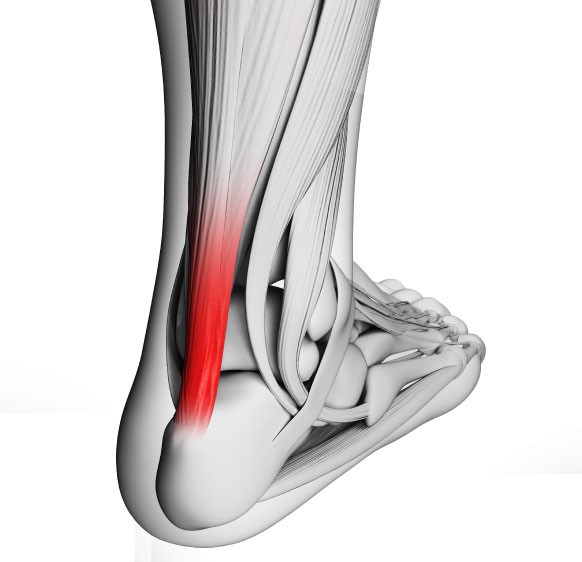
Achilles
The Achilles is the largest and strongest tendon in your body, but it’s also prone to various injuries, like a tear (rupture).
The team at Orthopaedic Foot & Ankle Center (OFAC) diagnose and treat Achilles ruptures and other injuries at their state-of-the-art facility in Falls Church and Arlington, Virginia. For expert care of Achilles tendon injuries in the Washington, DC, area, call or request an appointment online today.
Achilles Q & A

-
What is the Achilles tendon? Back to top
The Achilles tendon is a band of tissue that connects your calf muscles to your heel bone. Though the Achilles tendon is strong enough to endure the stresses of walking, running, and jumping, it’s also vulnerable to injury.
-
What are the common Achilles tendon injuries? Back to top
When the Achilles tendon is overly stressed or stretches beyond its means, injuries can occur. The team at Orthopaedic Foot & Ankle Center diagnoses and treats the full spectrum of Achilles tendon injuries, including:
Achilles tendonitis
Achilles tendonitis causes pain and inflammation from overuse of or damage to the Achilles tendon. There are two main types of Achilles tendonitis:
- Non-insertional, which involves small tears in the middle fibers of the tendon that cause pain and swelling
- Insertional, which occurs where the Achilles tendon meets your heel bone
Insertional Achilles tendonitis may cause bone spurs to develop.
Achilles rupture
If the tears in your tendon are severe, they may lead to a complete or partial Achilles rupture. This happens when the tendon fibers completely sever. An Achilles rupture is a serious injury that requires immediate medical attention.
PARS Minimally Invasive Achilles Repair
PARs (percutaneous achilles repair system) is a new, minimally invasive technique for surgical repair of the achilles tendon. With a smaller, 1-2 cm incision, there is less swelling and scar tissue formation vs traditional open techniques (10-15cm incision). With the use of this technique, our Orthopedic surgeons are able to progress patients through rehab and get them back on their feet faster.
OFAC patient incision after minimally invasive Achilles tendon repair
.png)
-
What are the symptoms of an Achilles tendon injury? Back to top
A complete Achilles rupture causes sudden, intense pain at the back of your ankle and lower leg. You may also hear a pop or snapping noise at the time of injury.
Achilles tendonitis is less severe, but still causes pain and symptoms, including:
- Thickening of the tendon
- Swelling and stiffness
- Difficulty walking on the injured leg
- Bone spurs on the heel
Without treatment, Achilles tendonitis progressively worsens and may become a chronic condition.
-
How are Achilles tendon injuries diagnosed and treated? Back to top
First, your provider at Orthopaedic Foot & Ankle Center carefully examines your foot and reviews your symptoms and medical history. They may take a diagnostic ultrasound or magnetic resonance imaging (MRI) scan to determine the extent of your Achilles injury.
Then, they recommend the best course of treatment for the type and severity of your condition. Treatment for Achilles tendon injuries include:
- Rest, ice, compression, and elevation
- Physical therapy
- Pain-relieving medications
- Custom orthotics
If your Achilles tendon injury fails to improve with traditional non-operative modalities, the OFAC team may recommend regenerative medicine such as platelet-rich plasma (PRP) or stem cell injections.
If your Achilles tendon is torn, you may need surgery. The surgeons at Orthopaedic Foot & Ankle Center perform minimally invasive procedures whenever possible.
Call Orthopaedic Foot & Ankle Center at the first sign of an Achilles tendon tear, or request an appointment online today.
-
 Foot & AnkleArlington, Falls Church
Foot & AnkleArlington, Falls Church -
 Foot & AnkleArlington, Falls Church
Foot & AnkleArlington, Falls Church -
 Foot & AnkleArlington, Falls Church
Foot & AnkleArlington, Falls Church